58 Antioxidants Rich Foods, Fruits & Vegetables to Include in Your Diet
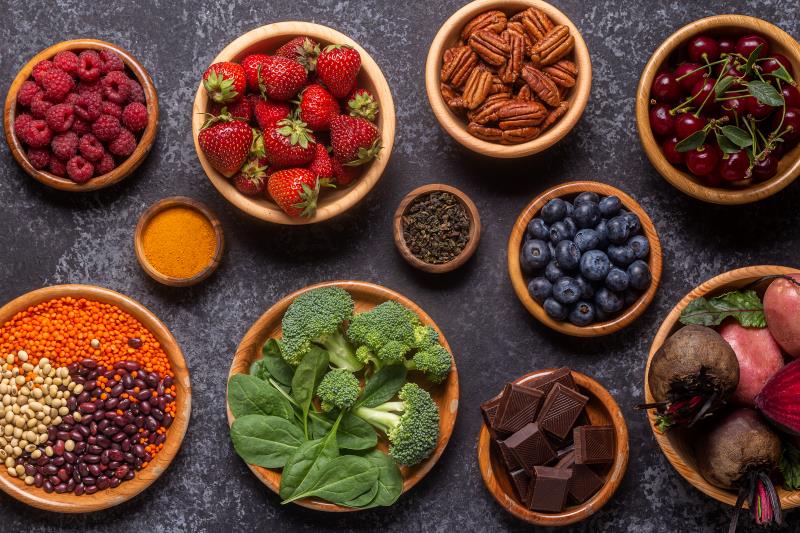
Antioxidants are essential to support good health and prevent the attack of harmful free radicals. A healthy lifestyle includes fruits and vegetables full of antioxidants. These foods supply the necessary elements for defending against oxidative stress, promoting long life and general health improvement.
So, to meet your overall well-being and nutritional needs, try different types of antioxidants rich food, thus maximising your intake and benefiting from them at the most levels possible.

Table of Contents

What are Antioxidants?
Antioxidants are substances that protect the body from damage caused by free radicals. Free radicals and unstable molecules can cause oxidative stress, resulting in cell and tissue injury. The risks of these radicals are reduced when they are neutralised by antioxidants through electron donation, thereby lowering their harm.
Antioxidants greatly impact health preservation and minimisation of chronic diseases, including cancer, heart diseases and ageing. Many different kinds of food, especially fruits, vegetables, nuts, seeds and some drinks contain antioxidants.
What are the Sources of Antioxidants?
Antioxidants help prevent oxidative stress and can be found in many foods. For instance, berries like strawberries or blueberries, citrus fruits such as oranges or lemons, and green leafy vegetables such as spinach, like broccoli or carrots, all provide high protection against this condition.
Additionally, legumes, whole grains, nuts, and spices like turmeric powder contribute greatly towards ensuring diverse intake levels, which promote good overall health & well-being.
Top 58 Food Items High in Antioxidants
Explore an array of nutrient-dense foods rich in antioxidants. These compounds are important for overall well-being as they guard cells against oxidative stress. They can be found in fruits, whole grains and nuts.
List of Antioxidants Rich Vegetables
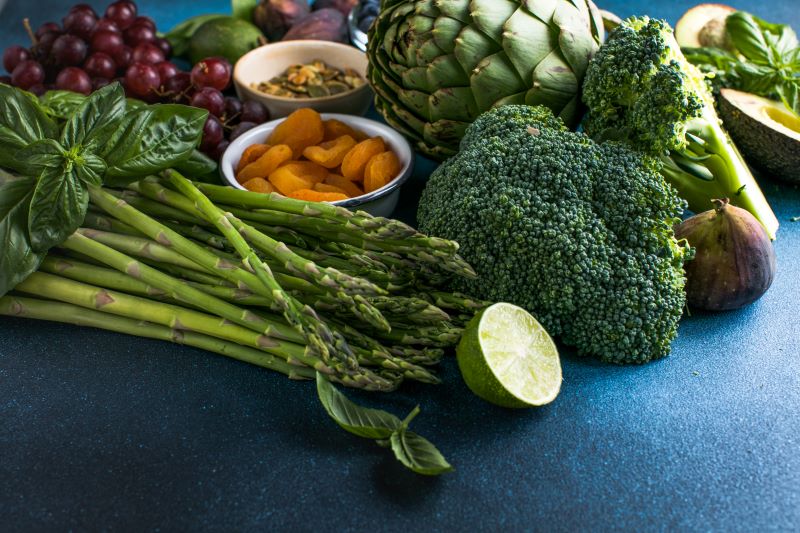
Discover a range of vegetables high in antioxidants that form part of a healthy, balanced diet that supports good cell health and immune system functioning.
These nutritional powerhouses are packed full of substances needed to fight off free radicals, thereby reducing oxidative damage within the body, so try incorporating some into your meal plans today.
SNo. |
Vegetables | Description |
| 1 | Spinach | It contains 2.2 mg of antioxidants per 100 grams, which makes it an excellent choice for overall health and well-being. |
| 2 | Kale | Kale consists of 1.5 mg of antioxidants per 100 grams, full of nutrients that support immune function and reduce inflammation. |
| 3 | Broccoli | It contains 0.9 mg of antioxidants per 100 grams. You need these essential nutrients to be healthy and full of energy. |
| 4 | Brussels Sprouts | For every 100 grams, brussels sprouts provide 0.8 mg worth of antioxidants. Eat them as part of a balanced diet for cardiovascular health and longevity. |
| 5 | Red Bell Peppers | Red bell peppers have 1.5 mg worth of antioxidants in every 100 grams. Not only do they taste great, but they also help you stay healthy. |
| 6 | Carrots | If you eat carrots in their raw form per 100 grams, your body will get 0.3 mg, just enough to keep your eyesight sharp while giving yourself something crunchy. |
| 7 | Sweet Potatoes | Every 100 grams serving size comes with 0.3 mg worth of antioxidants and promotes wellness all around. |
| 8 | Tomatoes | Tomatoes contain 0.4 mg per every 100 grams serving, thus providing burst flavours along with necessary nutrients needed by the body to live healthy lifestyles. |
| 9 | Artichokes | Artichokes have an astonishing 4.7 mg antioxidant content per 100 grams and promote detoxification processes within our bodies. |
| 10 | Asparagus | 0.5 mg of antioxidants per 100 grams. This makes it a light and flavorful addition to any meal and at the same time, helps in digestion. |
| 11 | Beetroot | 0.3 mg of antioxidants for every 100 grams consumed. The reason why beetroot is good is that it adds nutritional value, which promotes heart health. |
| 12 | Cauliflower | 0.3 mg of antioxidants with every 100 grams consumed. It can be used in various ways because it’s very nutritious and can help improve overall health. |
| 13 | Eggplant (Aubergine) | Eggplant (Aubergine) consists of 0.4 mg of anti-oxidants per 100 grams serving size. |
| 14 | Garlic | 1.0 mg full packed antioxidant properties per serving size equaling exactly one 100 grams. |
| 15 | Onions | 0.2 mg antioxidant content available for your consumption whenever you decide on using them within savoury recipes such as soups, and stews, which require deepening flavours. |
| 16 | Ginger | 0.2 mg anti-oxidant content available per 100 grams. |
List of Fruits Rich in Antioxidants
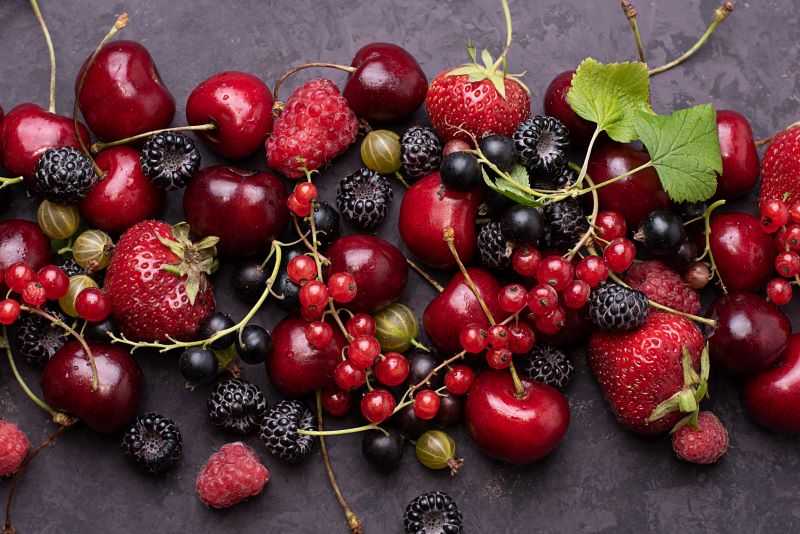
This top list includes different types, such as succulent berries or tropical flavours like mangos. They taste great and strengthen our immunity by preventing chronic diseases through their anti-inflammatory properties.
SNo. |
Fruits | Description |
| 17 | Blueberries | Blueberries have 97 mg of antioxidants for every 100 grams, meaning they are considered a superfood for the brain and fight off free radicals. |
| 18 | Strawberries | Strawberries contain 54 mg of antioxidants per 100 grams, making them a healthy and sweet choice that supports cardiovascular health and boosts the immune system. |
| 19 | Raspberries | Raspberries contain 46 mg of antioxidants in each 100 grams serving; in addition to providing vibrant colour and flavour, they also offer many other health benefits. |
| 20 | Blackberries | Blackberries have an antioxidant content of about 57 milligrams per every 100 grams. It promotes good overall health and is rich in anti-ageing properties, too. |
| 21 | Oranges | Oranges contain approximately 25 mg of these compounds per 100 grams, giving them their characteristic tangy taste and boosting immunity. |
| 22 | Lemons | Lemon juice has antioxidants equivalent to about 20 mg for every 100 grams. |
| 23 | Grapefruits | Grapefruit’s antioxidant value may be around 21 mg per 100 grams, thus making them great for hydrating yourself while taking care of your skin at the same time. |
| 24 | Pomegranate seeds | Each 100 grams of pomegranate seeds has 40 mg of antioxidants, making them crispy and nutritious when added to salads or snacks. |
| 25 | Apples | Apples contain 31 mg of antioxidants per 100 grams, making them a crunchy and delicious choice for improving heart health and digestion. |
| 26 | Red grapes | Red grapes provide approximately 19 mg of antioxidants per 100 grams. They are juicy and flavourful, which supports cardiovascular health. |
| 27 | Green grapes | Green grapes offer about 15 mg of antioxidants per 100 grams serving; they are refreshing and hydrating, hence suitable for overall wellness. |
| 28 | Kiwi | 26 mg of antioxidants is contained in each 100 grams of Kiwi fruit making it tropical and vitamin filled, thus can be used in smoothies or fruit salads. |
| 29 | Mangoes | Mangoes contain about 12 mg of antioxidant activity per 100 grams portion, consumed fresh or in other forms such as juice drinks. |
| 30 | Pineapples | Pineapples offer about 6 mg of antioxidant activity per 100 grams portion. |
| 31 | Papayas | 12 mg antioxidant activity is provided by 100 grams of papaya fruit eaten raw or processed into jams, jellies, canned fruits, etc. |
| 32 | Avocados | Avocados have 17 mg of antioxidant activity per 100 grams consumed fresh along with bread, toast, sandwiches, salads, soups, etc. |
| 33 | Cherries | Cherries contain 41 mg of antioxidant activity per 100 grams consumed fresh alone with burgers, tacos, cherries, ice creams, smoothies, etc. |
| 34 | Watermelon | 6 mg antioxidant properties per 100 grams serving. It is also beneficial in a juicy form. |
| 35 | Cranberries | It consists of 35 mg of antioxidants in 100 grams serving. |
| 36 | Goji berries | 43 mg antioxidant properties are available in 100 grams of serving. |
List of Cereals and Dairy Products Containing Antioxidants
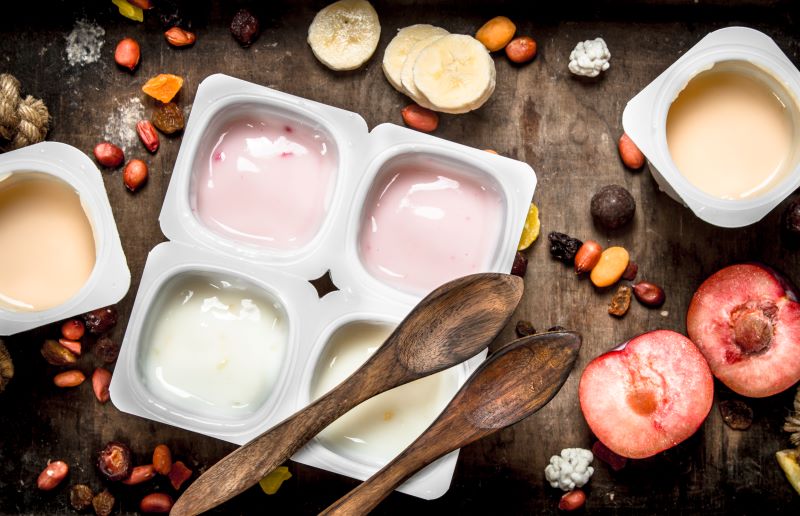
Check out a variety of cereals and dairy products that have been fortified with antioxidants. Here are a few foods with approximate values, which may vary according to different brands:
SNo. |
Cereals and Dairy Products | Description |
| 37 | Wheat germ | Wheat germ contains 15-20 mg of vitamin E per 100 grams and promotes skin health. |
| 38 | Bran cereal | Bran cereal contains 10-15 mg of vitamin E per 100 grams, promoting immune function. |
| 39 | Greek yoghurt | Greek yoghurt contains 0.1-0.2 mg of selenium per 100 grams, supporting thyroid function. |
| 40 | Yoghurt (plain, non-fat) | Yoghurt contains 0.1-0.2 mg selenium per 100 grams, enhancing immune response to external sources. |
List of Seeds and Nuts Rich in Antioxidants
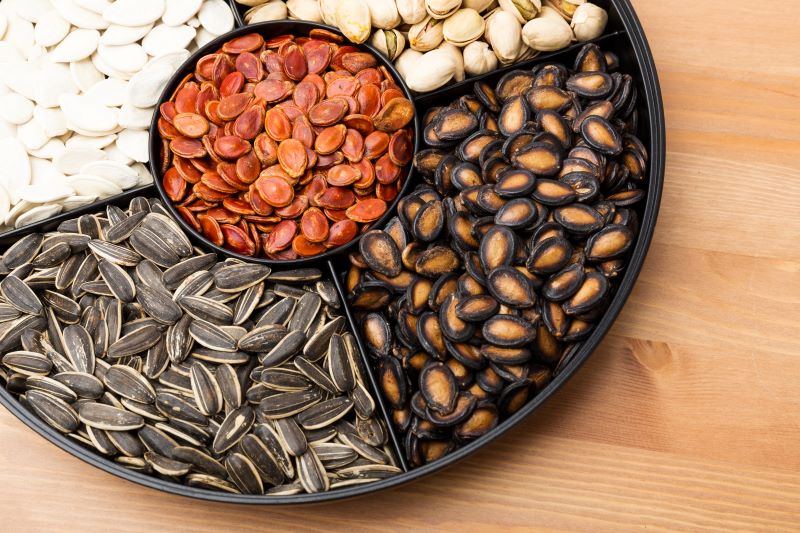
Various seeds and nuts are rich in antioxidants, vital for supporting cellular health and reducing the risk of chronic diseases. These snacks are full of nutrients and can be included in your meal plan.
SNo. |
Seeds and Nuts | Description |
| 41 | Almonds | Almonds contain 4.1 mg of vitamin E per 100 grams of serving, promoting skin health and immunity. |
| 42 | Walnuts | Walnuts provide 3.7 mg of vitamin E per 100 grams with a savoury flavour, supporting heart health and cognitive function. |
| 43 | Pistachios | Pistachios boast 2.9 mg of vitamin E per 100 grams serving, promoting antioxidant levels. |
| 44 | Pecans | Pecans with 1.4 mg of vitamin E per 100 grams offer a rich, buttery taste. |
| 45 | Hazelnuts | Hazelnuts provide 4.3 mg of vitamin E per 100 grams, boosting a nut-rich aroma and supporting eye health. |
| 46 | Brazil nuts | Brazil nuts contain 5.7 mg of selenium, which helps enhance thyroid function and antioxidant defence. |
| 47 | Sunflower seeds | Sunflower seeds provide 7.4 mg of vitamin E per 100 grams and help in reducing inflammation. |
| 48 | Pumpkin seeds | Pumpkin seeds provide 9.8 mg of vitamin E per 100 grams, offering protection against oxidative stress. |
| 49 | Flaxseeds | Flaxseeds contain 0.3 mg of vitamin E per 100 grams and also provide essential omega-3 for heart health. |
| 50 | Chia seeds | Chia seeds consist of 0.5 mg of vitamin E per 100 grams, supporting digestive health. |
| 51 | Hemp seeds | Hemp seeds consist of 1.9 mg of vitamin E per 100 grams, which is essential for skin health. |
List of Animal and Seafood High in Antioxidants
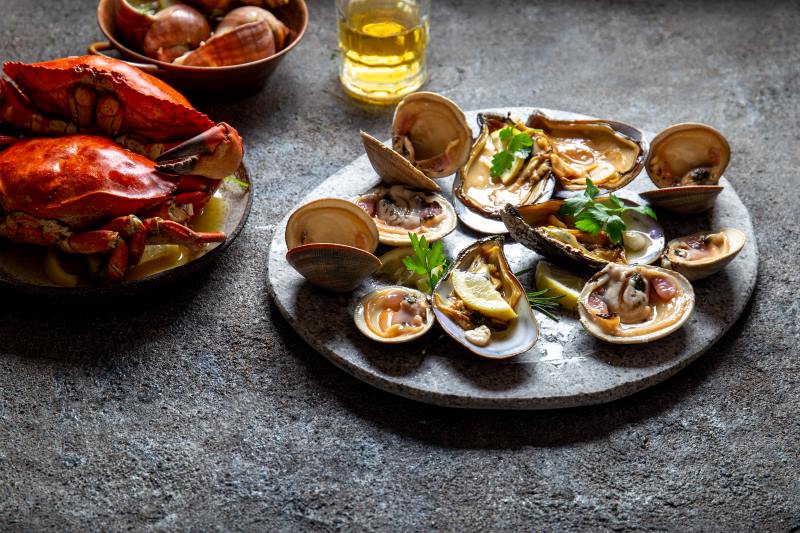
Look at different types of animal-based food products and seafood sources that are high in antioxidants. These provide the nutrients required for overall physical fitness.
SNo. |
Animal and Seafood | Description |
| 52 | Salmon | Salmon offers 2.5-3.5 mg of antioxidants per 100 grams which helps in reducing inflammation. |
| 53 | Trout | Trout provides 1.5-2 mg of antioxidants per 100 grams, promoting immune health. |
| 54 | Mackerel | Mackerel provides 1-2 mg of antioxidants per 100 g of antioxidants, protective against oxidative stress. |
| 55 | Sardines | Sardines consist of 1-2 mg of antioxidants per 100 g, boosting skin health. |
| 56 | Anchovies | Anchovies provide 1-2 mg of antioxidants per 100 g, adding a savoury flavour. |
| 57 | Tuna | Tuna contains 0.5-1 mg of antioxidants per 100 g, boosting healthy cell membranes. |
| 58 | Shellfish (e.g., shrimp, crab) | Shellfish consists of 0.2-0.5 mg of antioxidants per 100 g, offering a sweet flavour. |
How Much Antioxidants Should You Intake?
Here's a table outlining the recommended daily intake of antioxidants for different demographics according to the National Institutes of Health (NIH).
Age Group |
Recommended Antioxidants Intake (milligrams per day) |
| Infants 0-6 months | 0.4 mg |
| Infants 7-12 months | 0.5 mg |
| Children 1-3 years | 6 mg |
| Children 4-8 years | 9 mg |
| Children 9-13 years | 13 mg |
| Male Teens 14-18 years | 23 mg |
| Female Teens 14-18 years | 20 mg |
| Male Adults 19+ years | 34 mg |
| Female Adults 19+ years | 27 mg |
| Pregnant Teens | 23 mg |
| Pregnant Adults | 27 mg |
| Lactating Teens | 28 mg |
| Lactating Adults | 29 mg |
| Adults 50+ years | 28 mg |
Health Benefits of Including Antioxidants Rich Foods in Your Diet
When you eat a diet full of antioxidant rich food, there are many benefits to this, including fighting against free radicals caused by environmental pollutants. According to the Harvard School of Public Health, adding antioxidant rich food to your diet has a few health benefits.
- Fight Oxidative Stress: Antioxidants combat free radicals from the body, thus reducing oxidative stress and protecting cells from harm caused by oxidation.
- Maintain Cellular Health: Antioxidants repair damaged cells and help them regenerate for proper performance throughout their lifetime.
- Strengthen Immune System: By empowering our natural defence mechanism, antioxidants enable us to fight infections or diseases easily.
- Relieve Inflammation: Antioxidants possess anti-inflammatory qualities that may be used to relieve conditions linked to inflammation.
- Preserve Heart Health: Antioxidants keep the heart healthy by cutting down cholesterol levels and improving how blood vessels work.
- Improve Skin Health: Antioxidants can protect against collagen breakdown caused by ultraviolet exposure, promoting its production, hence leaving you with supple and younger-looking skin.
- Enhance Brain Functionality: Research suggests antioxidants could boost cognitive function, lowering the chances of getting such brain diseases as Alzheimer’s.
- Boost Eye Health: Preventing age-related macular degeneration (AMD) or cataract formation, which may lead to blindness if left untreated, keeps eyesight intact.
- Reduce Cancer Risk: Antioxidants can prevent DNA damage and inhibit cancerous growths, lowering the chances of developing various cancers.
- Slow Down Ageing Process: This is achieved through decreasing oxidative destruction brought about by these unstable atoms within our bodies attacking other cells around them.
Different Ways to Include Antioxidants Rich Foods in Your Diet
There are several ways to include foods rich in antioxidants in your daily diet. One method is blending various fruits to create smoothies for a great breakfast option, especially during hot weather. Here are various ways you can include antioxidants in your diet.
- Smoothies and Juices: Blend fruits rich in antioxidants, such as berries, spinach and kale, to create tasty smoothies or juices.
- Salads: Create vibrant salads with vibrant colours by adding bell peppers, carrots and tomatoes packed with antioxidants.
- Snack on Nuts and Seeds: Use a healthy snack, such as a handful of nuts, such as almonds and walnuts, packed with antioxidants, chia seeds, or flaxseeds.
- Add Berries to Breakfast: Include antioxidant-rich fruits such as strawberries, blueberries, or raspberries in your morning meal, such as oatmeal, yoghurt, cereal, etc.
- Include Dark Leafy Greens: You can add nutritious green veggies like spinach or kale into various soups, omelettes or stir-fries to enhance your taste buds and nutrition.
- Enjoy Antioxidant Rich Beverages: Drink some green tea now and then. You should also have a glass of red wine once in a while (moderately) because it is high in antioxidants.
- Use Herbs and Spices: Add flavour to your food using turmeric, cinnamon, and oregano, among others, since they contain many beneficial compounds, including antioxidants.
- Choose Whole Grains: Choose whole grains like quinoa, brown rice, and barley when making meals. These are rich in fibre and provide many other essential nutrients.
- Roast or Bake Vegetables: Prepare roasted vegetables for dinner, such as broccoli, Brussels sprouts and cauliflower, which are highly nutritious.
What are the Symptoms of Antioxidant Deficiency?
There are many signs that you may not get enough antioxidants, including increased vulnerability to infections or other illnesses. Here are some symptoms of antioxidant insufficiency.
What are the Health Risks of Not Getting Enough Antioxidants?
There are many signs that you may not get enough antioxidants, including increased vulnerability to infections or other illnesses. Here are some symptoms of antioxidant insufficiency.
- More Susceptible to Sickness: Depleted immune systems and recurrent infections in the body may suggest a lack of antioxidants.
- Tiredness and Weakness: Fatigue, weakness, and decreased energy levels are the major signs caused by a deficit in antioxidants.
- Early Ageing: Those without enough antioxidants may see premature ageing signs like creases, fine lines, or dull skin being more marked on them.
- Problems Healing Wounds: Insufficient antioxidants can lead to prolonged injury recovery and slow healing overall.
- Eyesight Issues: Antioxidant deficiency increases the risk for eye diseases such as cataracts or age-related macular degeneration (AMD).
- Mental Decline: A person’s thinking ability might worsen over time if they have low antioxidant amounts responsible for reducing oxidative stress.
- Higher Chance of Chronic Disease: You are more likely to get sick long-term with heart disease, cancer, or diabetes without an adequate supply of antioxidants.
- Inflammation: Having too few antioxidants can worsen chronic inflammation, leading to many health problems.
- Skin Trouble: Without enough antioxidants, skin conditions such as acne, eczema, atopic dermatitis, or psoriasis will worsen.
- Not Recovering Well from Exercise: After exercising, some people’s muscles hurt longer than others because their bodies do not produce enough antioxidants, which helps fix this problem.
What are the Side Effects of Excessive Antioxidants Intake?
While antioxidants offer numerous health benefits, excessive intake may lead to potential side effects and health risks.
- Pro-Oxidant Effects: Sometimes, antioxidants at high doses may work as pro-oxidants by causing oxidative stress rather than reducing it.
- Digestive Disturbances: An abundance of some types of antioxidants, such as vitamin C or E supplements, can lead to digestive problems, including diarrhoea and stomach cramps.
- Interference with Medications: Several antioxidants, like vitamin E, can affect drugs, making them less effective or causing side effects.
- Hypervitaminosis: Consuming excessive quantities of fat-soluble vitamins, which may be toxic when taken in large amounts, can cause nausea, headache, and dizziness.
- Increased Cancer Risk: It is commonly believed that taking too many antioxidant supplements can help cause certain cancers, especially among those who smoke cigarettes frequently.
- Altered Nutrient Absorption: Antioxidants taken at high levels over long periods interfere with the body’s ability to absorb other necessary nutrients, causing deficiencies.
- Risk of Bleeding: Blood thinners should not be mixed with massive antioxidants such as Vitamin E since this increases the chances of bleeding in people already predisposed.
Should You Take an Antioxidant Supplement?
Choosing an antioxidant supplement based on personal health needs and dietary habits is a subject for consideration. Antioxidants are preferably from a well-rounded diet of fruits, vegetables, nuts, seeds, and whole grains.
However, vitamins are good for those with certain health conditions or following particular diets because they can solve problems faster than food. However, it should be remembered that if taken in excess quantities, they may cause side effects.
Therefore, before deciding whether or not to use antioxidants, one should consult with medical professionals who will consider his/her situation.
Consuming antioxidant-rich food undoubtedly contributes greatly to our health. Whether it is protection against oxidative stress or prevention from chronic diseases, these substances help support cellular functions necessary for life energy levels. Supplements could still be useful, but only as additions, not replacements, for varied nourishing meals.
So, by prioritising fruits, vegetables, nuts, seeds, whole grains, etc., one can get more out of them while taking fewer risks. Hence, always consume everything in moderation, including variety, when dealing with free radicals!













